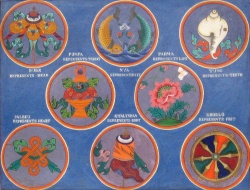Difference between revisions of "The Eight Auspicious Symbols of Buddhism"
Jump to navigation
Jump to search
| (One intermediate revision by the same user not shown) | |||
| Line 1: | Line 1: | ||
[[File:Ashtamangala.jpg|thumb|250px|]] | [[File:Ashtamangala.jpg|thumb|250px|]] | ||
| + | |||
| + | |||
| + | |||
| + | |||
| + | |||
| + | |||
{{Seealso|Ashtamangala}} | {{Seealso|Ashtamangala}} | ||
| − | |||
| − | |||
| − | # [[The Parasol in Buddhism |Parasol]] (chattra) - royalty and spiritual power | + | The [[Eight Auspicious Symbols]] ([[Ashtamangala]] in [[Sanskrit]]) are a group of [[lucky]] [[Buddhist symbols]] that appear on many [[Buddhist]] textiles, [[objects]] and paintings. Each [[symbol]] represents an aspect of [[Buddhist teaching]] and when they appear together, their [[powers]] are multiplied. |
| − | # [[The Golden Fishes|Golden Fishes]] (suvarnamatsya) - good fortune, fertility and salvation | + | |
| − | # [[The Treasure Vase |Treasure Vase]] (kalasha) - spiritual and material abundance | + | The [[symbols]] derive from [[Indian]] [[iconography]] and have become especially popular in [[Tibetan Buddhism]]. Clink a link below for a full article and illustration of each [[Auspicious]] [[Symbol]]. |
| − | # [[The Lotus Symbol in Buddhism |Lotus]] (padma) - mental and spiritual purity | + | |
| − | # [[Conch Shell in Buddhism |Conch Shell]] (sankha) - the fame of Buddha's teachings | + | |
| − | # [[The Endless Knot |Endless Knot]] (shrivasta) - infinite wisdom of the Buddha | + | |
| − | # [[The Victory Banner|Victory Banner]] (dhvaja) - victory of the Buddha's teachings and wisdom over ignorance | + | # [[The Parasol in Buddhism |Parasol]] ([[chattra]]) - royalty and [[spiritual power]] |
| − | # [[Buddhist Wheel Symbol (Dharmachakra) |Wheel (dharmachakra)]] - the teachings of the Buddha | + | # [[The Golden Fishes|Golden Fishes]] ([[suvarnamatsya]]) - [[good fortune]], {{Wiki|fertility}} and {{Wiki|salvation}} |
| + | # [[The Treasure Vase |Treasure Vase]] ([[kalasha]]) - [[spiritual]] and material abundance | ||
| + | # [[The Lotus Symbol in Buddhism |Lotus]] ([[padma]]) - [[mental]] and [[spiritual]] [[purity]] | ||
| + | # [[Conch Shell in Buddhism |Conch Shell]] ([[sankha]]) - the [[fame]] of [[Buddha's teachings]] | ||
| + | # [[The Endless Knot |Endless Knot]] (shrivasta) - [[infinite]] [[wisdom of the Buddha]] | ||
| + | # [[The Victory Banner|Victory Banner]] ([[dhvaja]]) - victory of the [[Buddha's teachings]] and [[wisdom]] over [[ignorance]] | ||
| + | # [[Buddhist Wheel Symbol (Dharmachakra) |Wheel (dharmachakra)]] - the [[teachings of the Buddha]] | ||
{{R}} | {{R}} | ||
Latest revision as of 18:03, 6 January 2024
- See also :
- See also :
The Eight Auspicious Symbols (Ashtamangala in Sanskrit) are a group of lucky Buddhist symbols that appear on many Buddhist textiles, objects and paintings. Each symbol represents an aspect of Buddhist teaching and when they appear together, their powers are multiplied.
The symbols derive from Indian iconography and have become especially popular in Tibetan Buddhism. Clink a link below for a full article and illustration of each Auspicious Symbol.
- Parasol (chattra) - royalty and spiritual power
- Golden Fishes (suvarnamatsya) - good fortune, fertility and salvation
- Treasure Vase (kalasha) - spiritual and material abundance
- Lotus (padma) - mental and spiritual purity
- Conch Shell (sankha) - the fame of Buddha's teachings
- Endless Knot (shrivasta) - infinite wisdom of the Buddha
- Victory Banner (dhvaja) - victory of the Buddha's teachings and wisdom over ignorance
- Wheel (dharmachakra) - the teachings of the Buddha
